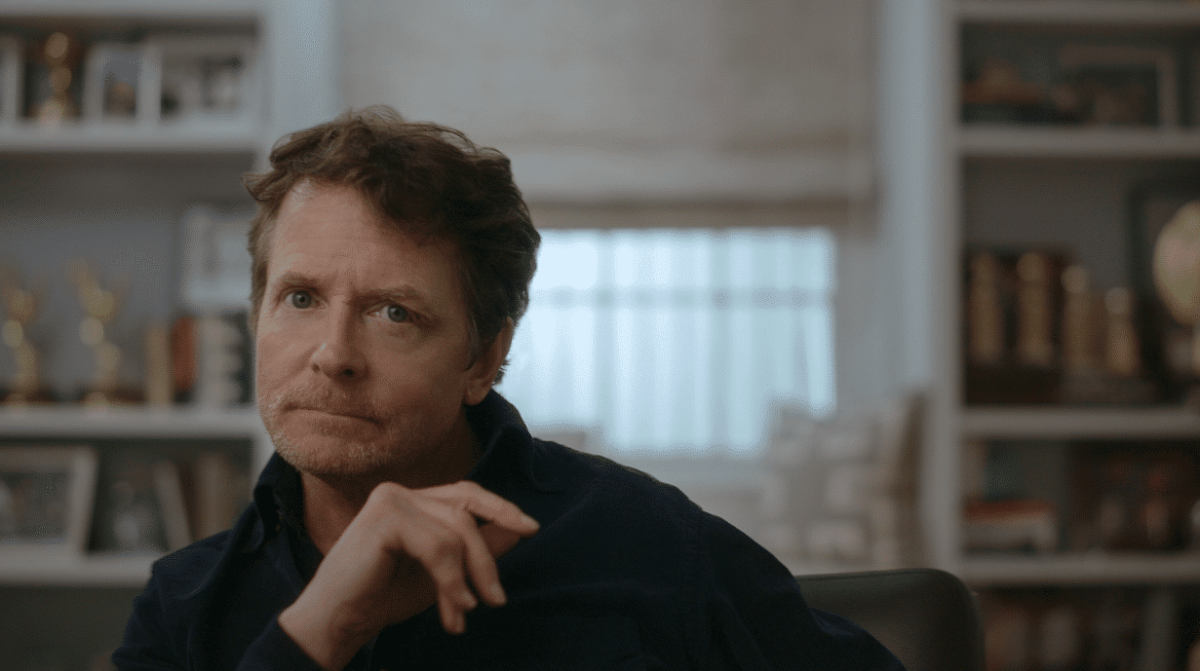‘Why do you want to make this movie now rather than in 20 years?’ Oscar-winning director Davis Guggenheim (An Inconvenient Truth) asks from off-camera.
Framed squarely in close-up, Michael J Fox tries to grin. ’20 years from now I’ll either be cured, or … a pickle.’
The pint-sized Back to the Future star is clearly frustrated that, at 61, as his Parkinson’s disease progresses, he can’t sell a joke like he used to. (‘I feel four feet tall!’ he exulted in 1986, accepting his first of five career Emmys for his scene-stealing role as Republican teenage dirtbag Alex P Keaton in the sitcom Family Ties.) But notwithstanding his confronting frailty, Fox’s quick wit illuminates this remarkable documentary, based on his four memoirs.
This is more than a nostalgic first-person history of a generation-defining star. And it certainly isn’t a sob story about how unfairly Parkinson’s stole his face, voice and physicality. Instead, it celebrates his strength of character as he shakes off showbiz bullshit, becoming more powerfully himself.
Playfully self-aware
I admired how this film draws attention to its own painstaking construction. To dramatise Fox’s history, Guggenheim deploys some of the same tactics Back to the Future used in its own recursive storytelling. The film seamlessly combines repurposed footage from Fox’s film and television work with judicious re-enactment sequences, family photos and videos.
The effect is uncannily vivid and playful, like being in the passenger seat of the time-travelling DeLorean. Effectively, the young Fox stars in a new biopic pieced together from his own oeuvre, narrated with wry lyricism by his older self. (You might recognise the voiceover style from The Wonder Years, or from its parodic use in Arrested Development.)
Read: What to watch in May: new to streaming, cinemas and film festivals near you
Guggenheim juxtaposes this Hollywood fairytale with the reality of Fox’s everyday life now. So much time has passed since 1998, when he went public with his diagnosis, that it’s become part of his public persona. He’s continued to act in TV roles in Boston Legal, Rescue Me, The Good Wife and Curb Your Enthusiasm – and won awards.
He’s publicly advocated for Parkinson’s disease awareness, and raised over US$1 billion for research through his charitable foundation, for which he won the Jean Hersholt Humanitarian Award in 2022. He’s written the aforementioned four books.
However, Guggenheim’s compassionate yet persistent observation reveals how hard-won Fox’s carefree public image has always been. Fox explains how he uses medication strategically, timing his doses to maximise the capabilities he needs in certain situations. We see him doggedly working on his balance and gait with a physiotherapist, and being helped by a speech therapist as he wrestles to record the very narration we’ve just heard – the one that had me thinking, ‘Wow! He sounds great! Just like he always has!’
The film focuses on the continuity in Fox’s life, not the loss. He has the same tenacity now that he needed as a Hollywood bit-player before his big Family Ties break. Parkinson’s may have ruined his flawless comic timing, but he can’t resist one-liners, and he even turns an undignified fall in front of a fan into a physical comedy bit: ‘You swept me off my feet.’ She laughs. He’s charming. Still.
“A tough sonofabitch”
Fox also frequently makes Guggenheim laugh off-camera in the interview segments – but that’s also when the Canadian-born actor is at his flintiest. Ironically, as the ‘diminished blinking and reduced facial spontaneity’ of Parkinson’s render his face more masklike, he lets his crowd-pleasing mask drop.
The man who emerges in these interviews is more vulnerable than he’s ever let himself be seen before, yet refreshingly without self-pity. ‘I’m in intense pain,’ he admits – before quipping about why he hasn’t mentioned it before: ‘It didn’t come up.’ Graciously, Fox lets us realise he’s approaching a scary tipping point: he’s falling more, injuring himself more in those falls, and the injuries are getting worse.
Now is Fox’s chance to reckon with his past mistakes. Diagnosed in 1991, when he first noticed his left little finger wiggling by itself, he fell into an alcoholic depression before resolving to conceal his symptoms. Guggenheim uses footage from later films like The Concierge (1993), or his 1990s TV hit Spin City, to show how Fox hid his worsening tremors by handling objects onscreen and keeping his body in motion.
Indeed, Fox often seems impelled through life by his own forward momentum. ‘I was never still,’ he remembers. At the height of his stardom, this was tough on his wife Tracy Pollan, a fellow actor who met him – and quickly deflated his ego – when she played his girlfriend on Family Ties. Despite her own talents, Pollan was left literally holding the baby while her husband made film after film.
Now, he regrets being an absent father. And as illness peels away his reasons to be restless, he and Pollan clearly adore their time together, and with their four kids. In one wonderful scene, they gang up on him to tease him for his poor texting habits. In another scene at their beach house, his son Sam calms his tremors by holding his hand.
As per the title of his first memoir, Fox understands he’s a lucky man. ‘How’s Tracy?’ Guggenheim asks at one point.
‘Married to me …’ Fox replies, ‘…still.
Still: A Michael J Fox movie is streaming now on Apple TV+
Actors:
Michael J Fox
Director:
Davis Guggenheim
Format: Movie
Country: USA
Release:




